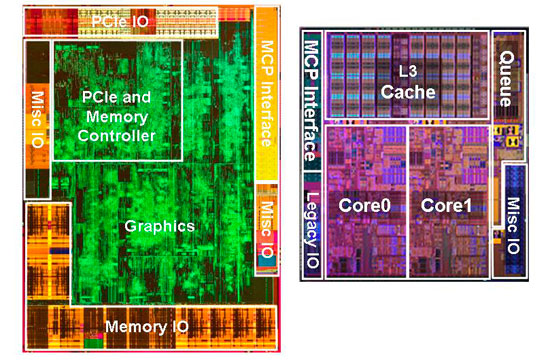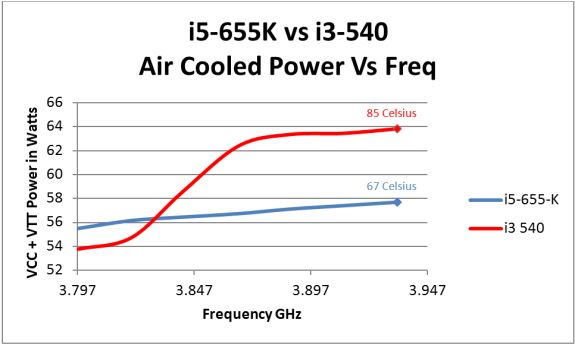Intel’s Core i5-655K & Core i7-875K: Overclocked and Analyzed
by Rajinder Gill on May 28, 2010 5:00 AM ESTBetter than our i3-540 for Overclocking?
Part of the attraction generated by the allure of unlocked multiplier processors is the additional flexibility purportedly provided, allowing any manner of clock domain frequency combinations. The obvious question has to be what an unlocked multiplier set offers the Clarkdale topology? The real ticket to retaining performance on this platform is to keep QPI frequency as close as possible to processor core frequency. That’s because the memory controller is off-die and the CPU communicates with the memory controller via the QPI link (the data link between the MCP stages in the images below).

Too wide a gap between both clock domains and the CPU must hold data for longer periods of time in the associated buffer stage before it can be transferred to the next bus. As a result, setting too high a CPU multiplier with too low a reference clock (BCLK) would neglect QPI bus frequency. This is because Intel limits the range of QPI multipliers at our disposal. What we want to use is a CPU core multiplier that is the same as or one notch higher than the QPI multiplier ratio.
Another thing that becomes readily apparent with the Clarkdale topology is that memory speeds around the DDR-3 1800 mark are generally the upper limit for most processors when absolute stability is required at reasonable voltage levels. Slightly higher speeds are possible but only by sacrificing valuable memory access latency – meaning you have to either run loose memory timings or drop QPI frequency to compensate. Given the choice, we’d sacrifice a little memory bandwidth before sacrificing a lot (lowering the QPI frequency). With this in mind, all of our comparisons have been made using the highest available QPI multiplier ratio on each processor, with the actual QPI frequency closely matched:











51 Comments
View All Comments
wavetrex - Friday, May 28, 2010 - link
In the table it sais $284 for the 980X, that MUST be a mistake!mianmian - Friday, May 28, 2010 - link
In a previous Anandtech aritical, it was $999, maybe it is $824 nowTexpat - Friday, May 28, 2010 - link
I think the price for the 980x might be wrong. $1,000 would be closer tot he truth.ltcommanderdata - Friday, May 28, 2010 - link
I'm really pleasantly surprised that the 2.93GHz Core i7 875K at $342 is cheaper yet has more features than the 2.93GHz Core i7 870 at $562. Although I'm guessing that's only temporary as the upcoming 3.06GHz Core i7 880 will probably take over the $562 price point, with the Core i7 870 dropping down to $284 and the Core i7 860 being phased out. There's also a Core i5 760 to replace the Core i5 750.DrMrLordX - Friday, May 28, 2010 - link
You guys really busted out the big guns with the dual-stage cascade! Please do this more often when overclocking. I would love to see a C3 Propus at -100C (or a Thuban).jleach1 - Friday, May 28, 2010 - link
On the second page, i believe in the 'test rig' table the proc is listed as a i5-870 instead of the i7-870Rajinder Gill - Friday, May 28, 2010 - link
Thanks - fixed!GeorgeH - Friday, May 28, 2010 - link
"it’s full of talk about voltages and harps on about overclocking"No need to be shy about that - Anandtech is bookmarked because of awesome articles and analyses like this one.
FlanK3r - Friday, May 28, 2010 - link
not bad, my x6 1090T is full stable 4300MHz 2800MHz NB with aircooling ,-)...for games and benchmarks 4400-4450 MHz :)AstroGuardian - Friday, May 28, 2010 - link
Guys, i think you should not hurry to release articles instead of taking them slow and sure. Many typos especially in the graphs.i3-530 vs i5-540